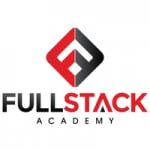
Fullstack Academy
Fullstack Academy Reviews and Guide
Fullstack Academy is one of the top-tier coding bootcamps today, with its students hired by companies such as Google, Amazon, and Facebook. But how did it reach its current status?
This Fullstack Academy review explores how the coding bootcamp came to be, and how it continues to produce highly qualified tech professionals.
What You Need to Know About Fullstack Academy
Fullstack Academy is a New York-based coding bootcamp that offers full-time and part-time software engineering and cyber security programs. It was founded in 2013 by software engineers David Yang and Nimit Maru on the idea that teaching tech skills is crucial to the future of work.
While Fullstack Academy also holds classes on its New York and Chicago campuses, all in-person bootcamp programs are being temporarily held online due to COVID-19. Below are further details you need to know about Fullstack Academy.
- Cost: Immersive Programs: $15,980 to $17,910; Prep Class: $199
- Schedules: Full-Time Immersive, Part-Time Flex Immersive
- Courses Offered: Full-Time Coding Bootcamp, Part-Time Flex Coding Bootcamp, Grace Hopper Program, Web Development Fellowship (WDF), Cybersecurity Bootcamp
- Upcoming Start Dates: Varies by course and location
Fullstack Academy Curricula: What Can You Study?
Fullstack Academy offers five immersive bootcamp programs in software and web development and cyber security. It also offers a preparatory course for those who wish to learn the basics of coding before jumping into any of Fullstack Academy’s immersive programs.
Bootcamp Prep: Intro to Coding
As the title implies, this is a coding 101 class that lays out the foundations of writing code in HTML, CSS, and JavaScript. Take this program if you want to get a glimpse of what you can expect from a software engineering and software development career. It’s also a great way to gauge your interest in the field and ability to commit to an intensive learning experience.
There are three schedules you can choose from, namely, Prep in a Week, Prep in a Month, and Prep Online. The first two offer a guided learning structure and cost $199. Prep Online, meanwhile, is free but completely self-paced.
Software Engineering Immersive (Full-Time Coding Bootcamp)
Learn software development in as short as 17 weeks with Fullstack Academy’s JavaScript-driven curriculum. Students of the Software Engineering Immersive go through three phases. First is the Foundations Phase, a month-long foundations course that serves as a required pre-work for the immersive program. During this time, students learn about HTML, CSS, advanced JavaScript closure, and the differences between front end and backend development.
The immersive, full-time schedule starts with the second phase, otherwise known as the Junior Phase. For five days a week, students dive deep into the front end development and backend development of web and mobile applications.
You’ll develop fluency in programming languages such as HTML5, advanced CSS, and JavaScript. You’ll also learn about cutting-edge technologies and libraries like React and Node.js.
Lastly, the class culminates with the Senior Phase where you start putting the skills and knowledge you learned into practice. Hands-on training continues six days a week as you participate in a guided team project, a personal project, and a capstone project. By the end of the program, you’ll have built an e-commerce site and a web or mobile application.
The full-time coding bootcamp program used to be offered on-campus, but it has since been moved to remote instruction due to COVID-19.
Software Engineering Flex Immersive (Part-Time Coding Bootcamp)
The Software Engineering Flex Immersive follows the same curriculum as the Full-Time Coding Bootcamp program. The only differences lay in the time to completion and the learning medium.
Since this program is offered part-time, it naturally takes longer to complete at approximately 28 weeks. Moreover, the Software Engineering Flex Immersive has always been offered online.
Cybersecurity Bootcamp
With the rapid shift to cyberspace, more and more companies have had to protect their data from cyberattacks. This has led to increased demand for cyber security professionals. In response, Fullstack Academy has partnered with New York City to take part in the 100-million dollar Cyber NYC Initiative to make the city a global leader in cyber security.
The Fullstack Cyber Bootcamp can be taken full-time for 17 weeks or part-time for 26 weeks. The full-time program prepares students to be penetration testers or security analysts. The full-time program, meanwhile, prepares students solely for the latter.
JavaScript at Grace Hopper
One unique program that Fullstack Academy offers is the Grace Hopper Program, a software engineering program for women+ students. The program is meant to encourage more women, including trans and nonbinary folx, to break into tech.
Grace Hopper Program offers a JavaScript-focused curriculum that covers six learning areas. These are computer science, front end development, backend development, databases, tools and best practices, and masters series. The program costs $17,910, payable through a scholarship, private loan, or an income share agreement.
Web Development Fellowship
The Web Development Fellowship trains rookie programmers to become professional developers in 24 weeks and for free. The program is a result of Fullstack Academy’s partnership with the NYC Tech Talent Pipeline. Because of this, enrollment in the program is only open to current residents of the city who meet other eligibility requirements.
Fullstack Academy Campuses: Where Can You Study?
Fullstack Academy offers classes online and in several different locations, including the following:
- New York City
- Chicago
- Online / Remote
- Atlanta
- Baton Rouge
- Jacksonville
- Los Angeles
- New Orleans
- New York City
- San Diego
- San Francisco
- San Luis Obispo
- Washington
Fullstack Academy School Schedules: When Can You Study?
Full-Time
The full-time program varies in length depending on the bootcamp program but can take between 13 and 28 weeks.
Part-Time
Students taking the part-time schedule can expect to attend classes three days a week, including two weeknights and one Saturday. Classes typically last three to four hours.
Fullstack Academy School Tuition
Fullstack Academy’s immersive programs generally cost $17,910. While that is significantly lower than the cost of college education, it’s still a big investment. Fortunately, Fullstack Academy offers a variety of payment and financing options.
Fullstack Academy Financing and Payment Options
- Upfront Payment. Pay a $2,000 deposit upon enrollment, and then pay $15,910 during the program.
- Early enrollment. There is a discount for those who enroll up to four weeks early. They will receive access to foundation materials as well.
- Private Loans. Loans are offered through Ascent Funding and Climb Credit.
- Income Share Agreement. This option allows students to only pay a $2,000 deposit and defer their tuition until 28 days after they land a job.
- Scholarships. Fullstack Academy has a variety of scholarships available. There’s the Edie Windsor Scholarship that covers 50 percent of the tuition of gender-nonconforming students and LGBTQ+ women. There’s also the Ada Lovelace Scholarship that grants a $1,000 scholarship for women+-identifying students who pay upfront.
- VET TEC Program. Although Fullstack Academy is currently not accepting payments through the new GI Bill benefits, veterans may still be eligible for the VET TEC program. They also automatically receive a $1,000 scholarship upon enrollment.
Fullstack Academy Admissions: How to Get In
The admissions process at Fullstack Academy consists of four steps: preparation, application, assessment, and interview. After familiarizing yourself with basic programming skills, fill out an online application form accessible through the Fullstack Academy website.
If you’re applying for any of the Software Engineering Immersive programs, you’ll sit in on a 75-minute timed exam that consists of five coding challenges. If you’re applying for the cyber security bootcamp, you’ll sit through a 30-minute assessment composed of 20 logic and critical thinking questions.
If you pass the assessment, you’ll be invited for an interview conducted by a Fullstack Academy graduate or instructor. You will then be asked to complete a 75-minute pair programming challenge done over Skype. Cyber security candidates, meanwhile, are asked to complete a 10-minute video interview.
If you complete and ace all four steps, you’re guaranteed a seat at Fullstack Academy.
Fullstack Academy Criteria
Fullstack Academy favors basic knowledge of programming fundamentals, a growth mindset, and excellent teamwork skills when looking for a potential student. If all three of these apply to you, then you are one step further to securing a seat at Fullstack Academy.
Fullstack Academy Interview
Prospective students will need to attend an interview before being accepted to Fullstack Academy. One highly recommended tip to ace this interview is to read over Fullstack Academy’s prep guide. Another great resource is Fullstack Academy’s article titled “How to Ace the Fullstack Academy Interview” written by co-founder Nimit Maru.
Note that the questions will focus on getting to know you better. This includes your personal goals, motivations, technical knowledge about the field you wish to break into, and how you respond to specific situations.
Fullstack Academy Admission Rate: What Are My Chances of Getting In?
Fullstack Academy boasts having one of the most rigorous admissions processes among coding bootcamps. How rigorous? Its acceptance rate stands at eight percent. Also, applicants who fail on their first try only get one more chance to apply again.
Fullstack Academy Outcomes: Will I Find a Job?
Fullstack Academy has an excellent record of positive employment outcomes for its graduates. A case in point: a sizable number of Fullstack Academy graduates found employment at reputable companies such as Google, Amazon, Spotify, Venmo, The New York Times, Lyft, American Express, CNN, and Dropbox.
Their starting salaries are also higher than the average starting salaries for entry-level roles. Fullstack Academy graduates from the Chicago campus earned a median starting salary of $72,000, higher than the $55,000 average.
Fullstack Academy NYC grads, meanwhile, reported a median income of $90,000, compared to the $60,000 median income of other grads.
Job Placement Services at Fullstack Academy
Fullstack Academy’s support for its students continues onto the job hunt through its Career Success team. Some career services they offer include career coaching, interview prep, networking opportunities, resume help, and negotiation tips.
Should You Apply to Fullstack Academy?
If you’re on the lookout for a high-quality software engineering and cyber security bootcamp, then Fullstack Academy should be at the top of your list. The bootcamp is held in high regard in the bootcamp industry, not to mention its students receive job offers at the biggest tech companies all over the US. Below are other points worth noting.
- Job Placement. Fullstack Academy has an excellent reputation in the industry as being one of the most successful bootcamps in the US. Its graduates have successfully secured jobs in nearly 850 tech companies.
- Career-ready Graduates. Because of its market-led curricula, Fullstack Academy produces career-ready talents in software engineering and cyber security. It’s worth noting, however, that Fullstack Academy doesn’t have a dedicated data science program.
- Rigorous Admissions Process. Acceptance into Fullstack Academy takes more than just motivation and interest. You have to prove that you are cut out of the program and that you have the basic knowledge needed to keep up with the demands of the program.
- Diversity Scholarships and Programs. Fullstack Academy offers a range of bootcamp programs and scholarships designed to help members of underserved communities.
Fullstack Academy has the full package: cutting-edge curricula in software engineering and cyber security, a menu of financing options, remote-led and flexible programs, and career services. If these are what you’re looking for, then consider applying at Fullstack Academy.
Price Range
$0-$17,910Programs Available
Programs Pace
Financing Options
7 Reviews
Sorry, the comment form is closed at this time.



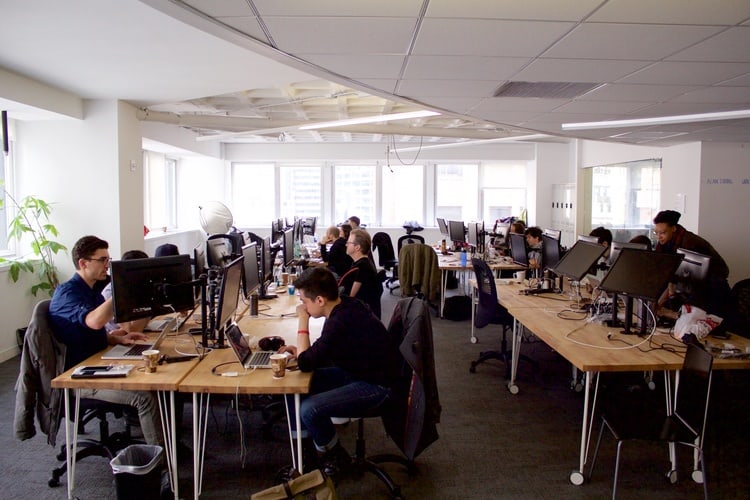
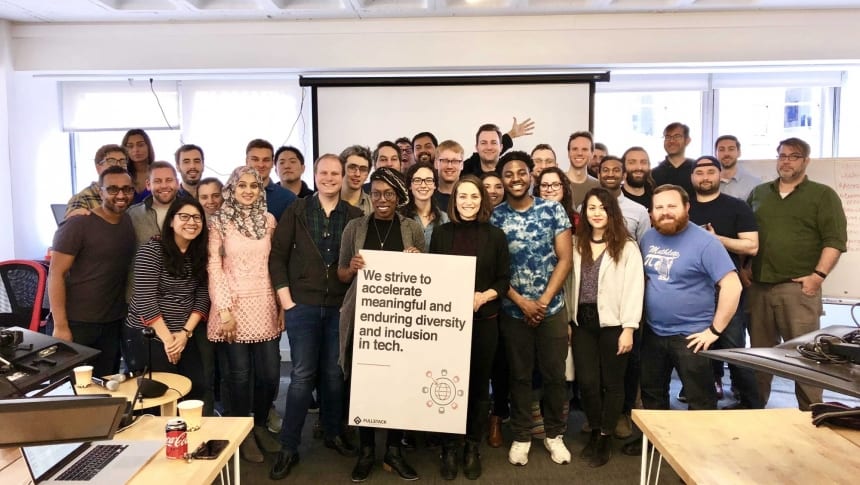
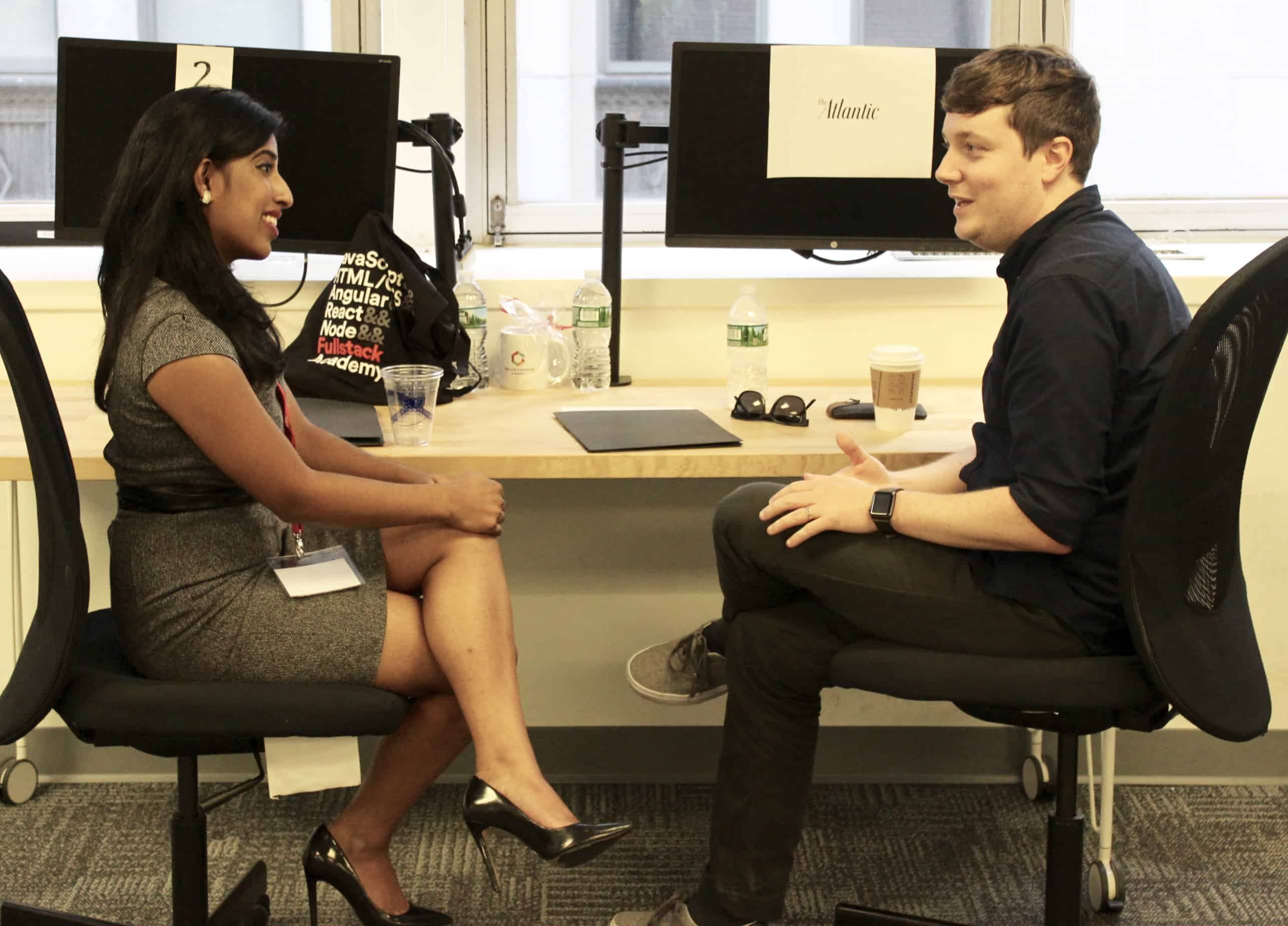

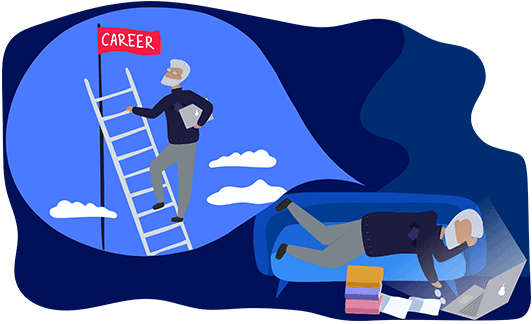





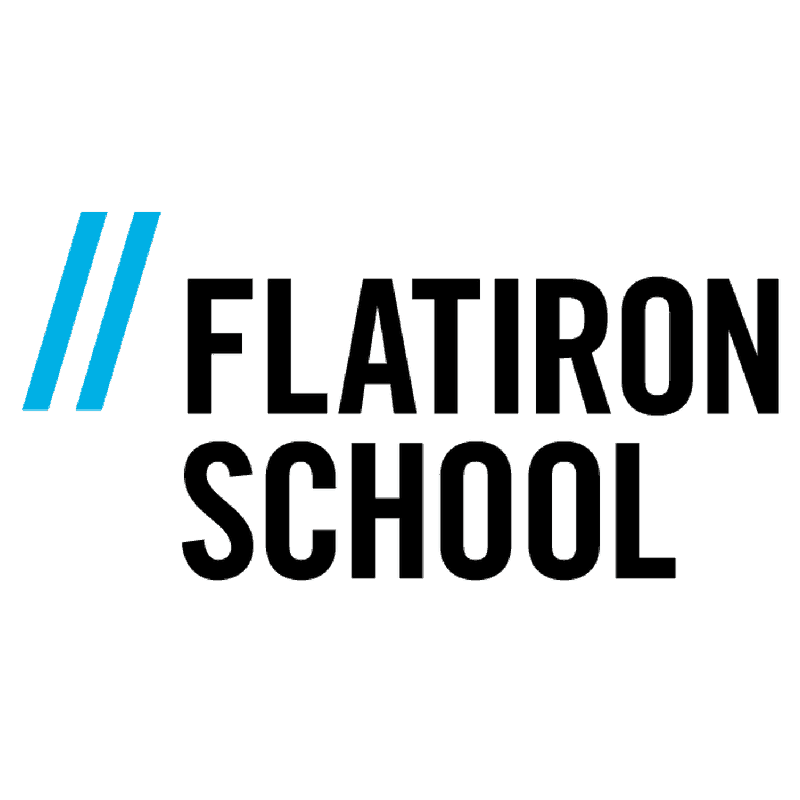

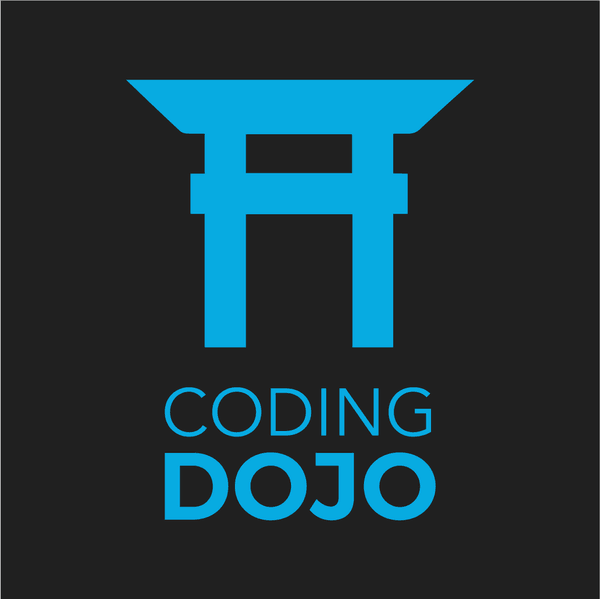



Anonymous
I always thought coding seemed cool, so I thought I’d pay the super resonable fee take Bootcamp Prep on-campus and just see what happens… 8 months later I am nearing the end of my fellowship, having accepted a life-changing job offer, and I can now officially define myself a software engineer. This is not the way I ever imagined my life would go, considering I graduated college with a creative writing degree, but I’ve truly never been happier or ever felt this proud of myself.
The curriculum, the staff, and the other students are all incredibly dedicated and hardworking. I feel as though I have gained lifelong friends and mentors.
If you’re considering a coding bootcamp, no matter if you’re considering Fullstack or a lesser camp, take Fullstack’s Bootcamp Prep to experience the deeply supportive culture and supreme curriculum. Who knows, maybe 8 months later you’ll be crushing it as a software developer at a major international company just like me!
April 18, 2020
Anonymous
Fullstack Academy is a fantastic program that took me from knowing little to nothing about coding to having a skillset good enough to get me a job as a software engineer. Their program is a great educational balance of practicality and theory. I cannot recommend it higher. It truly turned my life from having no direction to on the road to a great career in tech! The instructors are great, the program is great, and the career advisor is a fantastic help. Couldn’t have made this happen without the preparation and support fullstack provides for both its students and fellows.
April 20, 2020
Anonymous
I couldn’t have learned this much information this fast without Fullstack Academy. The instructors were incredibly helpful not only in teaching the information, but also getting you to think like a software engineer. I learned the most useful technologies and also “learned how to learn.” I was able to get a job from the launch day as well with the help of the career counselor, Holly Valenty. I also gained some friends along the way, and I’m so glad I did an in-person program as opposed to self-study or online. I highly recommend Fullstack Academy, it worked for me!
May 13, 2020
Anonymous
Great instruction and curriculum by Priti, Ben W., Collin, and Finn. With only a few technologies, FSA spends more time teaching what is harder to learn on your own, teaching high-level concepts with practical application. Excellent career support by Holly that does not make unrealistic promises or do any of the work for you: they are support in the perfect sense and show you how to have the most efficient job search possible. My few qualms are not as much raw SQL and data structures/algorithms instruction as I would I have liked, and I feel the basic concepts of these would be easy to incorporate into the Foundations portion of the course, which would leave a little more time for more in-depth study/practice that is harder to do on one’s own during the immersive phase.
June 11, 2020
Anonymous
I found my love for programming very late in college, and as a result was unable to pursue it very far while I was still in school. I weighed the option of a masters vs. a boot camp, and ultimately decided that a boot camp made more sense for me both professionally and financially. When it came to choosing which boot camp I wanted to do, I didn’t shop around much. I figured that if I was going to invest so much time and money, I was going to do it at the best boot camp.
Coming out of Fullstack, I can confidently say that enrolling here as a student was one of the best decisions I’ve ever made for myself. The program offers high quality instruction, and the staff and instructors are dedicated to creating the best possible experience for students. My fellow cohort-mates as well as the alumni I’ve met have also all been incredibly supportive. After about 6 weeks of job searching, I’m now gearing up to start my new job, and couldn’t be more excited for my future!
July 19, 2020
Anonymous
When I first heard about the phenomenon of coding bootcamps, I was incredibly skeptical. However, after completing Fullstack Academy’s Software Engineering Immersive, I am a true believer that a good bootcamp can change your life (and career ).
Initially I chose to attend Fullstack for two reasons:
1. By requiring students come in with a baseline of knowledge, you are able to move more quickly and spend the limited time of the bootcamp covering more advanced topics (side note: I took the Bootcamp Prep course and was more than ready for to apply for the immersive by the end).
2. The idea of focusing on only one language/stack also leaves more time for honing skills and going deeper into concepts instead of learning different syntax for essentially the same things.
After completing the program, I still agree with both of those statements. However, they are only the beginning of what sets Fullstack apart…
Before attending Fullstack, I was a middle school math and science teacher. Coming from a background in education, I was very impressed with the curriculum and overall educational experience Fullstack provides for a variety of reasons, including:
• Each lecture is followed by a workshop in which students get to actually practice using the new information.
• The curriculum builds incrementally on itself, introducing concepts in a logical order. While new topics are introduced in quick succession (there is a TON to learn in not a lot of time), the nature of the workshops and projects requires students to continue using all of the skills they have previously covered. This not only provides additional practice, but also helps students understand how the various pieces fit together.
• Fullstack has found a good balance between explaining the most important ideas, while still requiring students to figure out how to implement them on their own. I think the most important thing I learned at Fullstack Academy is how to read documentation and teach myself to use new technologies.
This is then revisited in the second half of the program (see comment above) by asking students to choose new technologies/tools they are interested in learning about and using them to build a project of their own design.
When applying to jobs, I was able to tell interviewers that I was confident I could teach myself whatever languages and tools they use. (In fact, for one job application I taught myself an entire new language and became very comfortable using it in about one week!)
• It feels like the staff really cares about each student and their success. I saw this play out in two main ways:
1. Support: the instructors and teaching fellows are genuinely happy when students ask them questions or request office hours.
2. Assessment: it is made very clear that the purpose of assessments is to ensure that students have made an appropriate amount of progress, or to find out what they might need more help with. During the immersive portion of the program, there are no “passing” or “failing” scores — assessments are looked at holistically to determine what each student needs at that point to be successful.
• Fullstack purposefully crafts a supportive, collaborative environment by explicitly teaching in the first week such topics as why pair programming is important and how to do it well, how to combat implicit biases, and how to give clear, helpful feedback.
• The instructors elicit and actually respond to feedback! Not only do they make small tweaks if requested during a specific cohort, but they are constantly looking for ways to improve upon the curriculum and program as a whole and then implement them!
• On the topic of instructors: each of the instructors is extremely knowledgeable and brings examples from their own experience to highlight what they are teaching!
———-
As someone who has tremendous anxiety around applying for jobs, I particularly took advantage of the Career Success team. During the bootcamp, I appreciated the guidance on such topics as creating a technical resume or harnessing LinkedIn. Then, during my job search I consistently referred back to the materials they provided us. But most importantly, I felt like I could always reach out to Holly, our Career Success counselor, for answers to even the most inane questions! She was beyond helpful in my search for that first job out of bootcamp, which I can’t wait to start next week!
———-
TL;DR Fullstack Academy provides a well-designed curriculum, supportive and knowledgeable instructors, and personalized career support. I couldn’t recommend it more!
July 23, 2020
Anonymous
Fullstack Academy has great instructors and career team that wants you to succeed. The course content is valuable and the career team is always just an email away with help. Highly recommend.
August 15, 2020